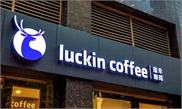
Illustration: Luo Xuan/GT
Many coffee lovers may have been somewhat surprised, but a number of insiders long felt it was all too good to be true. Luckin Coffee, the Xiamen-headquartered coffee chain that became Starbucks' chief rival in China, said last week that its COO and other employees had been suspended for inflating sales figures from last year's second quarter to the fourth quarter by an astounding 2.2 billion yuan ($310 million).
The company's NASDAQ-listed stock dropped nearly 80 percent the day Luckin confessed to fabricating transactions. Market watchers are still analyzing the sheer scale of the fraud and how it was allowed to happen.
But it seems Luckin's luck has yet to run out. Downloads of the company's APP had a huge bump in recent days. Customers rushed to Luckin stores or made online orders, giving the coffee chain a sales boost, even while a potential fraud case has already cost investors millions.
Analysts have suggested there are a number of reasons for the jump in coffee sales. Apparent customer loyalty might have something to do with nationalism and pride in a domestic brand that can compete with a rival as powerful as Starbucks. Or perhaps APP users were just scrambling to cash in their accumulated coupons before Luckin goes bankrupt.
Luckin should feel lucky that despite the revenue scandal it still has customers, many of whom are not exactly lovers of coffee, especially Luckin coffee. Many are showing brand loyalty because a cuppa at Luckin is less expensive than at Starbucks.
Whatever fate befalls Luckin, one has to admit it started by seizing the moment in a very ambitious way. Founded in 2017, Luckin's meteoric rise saw the brand become the largest coffee chain in China with more than 4,500 stores, surpassing giant Starbucks in December 2019.
The company latched onto China's flourishing internet, digital technology and vast courier network to provide hand delivered coffee with just a few clicks, and a wait of just a few minutes. One of my friends in Shanghai told me that Luckin Coffee's unique use of digital marketing was used as a case study during a marketing conference she attended in 2018.
It's interesting to see just how successful both Luckin and Starbucks have been in China considering it's a nation of tea drinkers. Many of my Chinese friends who drink the odd cup of coffee don't exactly think it tastes great. My husband has never had a cup of coffee, and my last cup was from Luckin last summer and only because I had a coupon for a free one.
Yes, coffee drinking is still pretty much a trendy, status-seeking thing to do in China. Maybe this is part of the cause of Luckin's failure, especially considering that people who actually like coffee say Starbucks' is better.
To keep non-lovers of coffee drinking its coffee, Luckin needs to not only improve its coffee, service and prices, but it also needs to clean up its reputation as an honorable Chinese company.
There was more problematic news about two other Chinese, US-listed companies with huge ambitions that were accused of financial finagling on Wednesday. China's streaming platform iQIYI has denied it fiddled with revenue figures and its stock dropped a few percentage points. But TAL Education Group's shares dropped as much as almost 30 percent after it was revealed that an employ had inflated sales by hundreds of millions of dollars.
These companies' listings on the US market and the reputation of their Chinese competitors will inevitably and unfortunately be affected.
The same goes for Luckin. Its attempt to become a standout in the market, and its ambition to rival a strong American brand, maybe worth praise for many Chinese people, but without financial integrity, its initial successes will indeed prove to be too good to be true.
The author is a commentator with the Global Times. wangwenwen@globaltimes.com.cn



